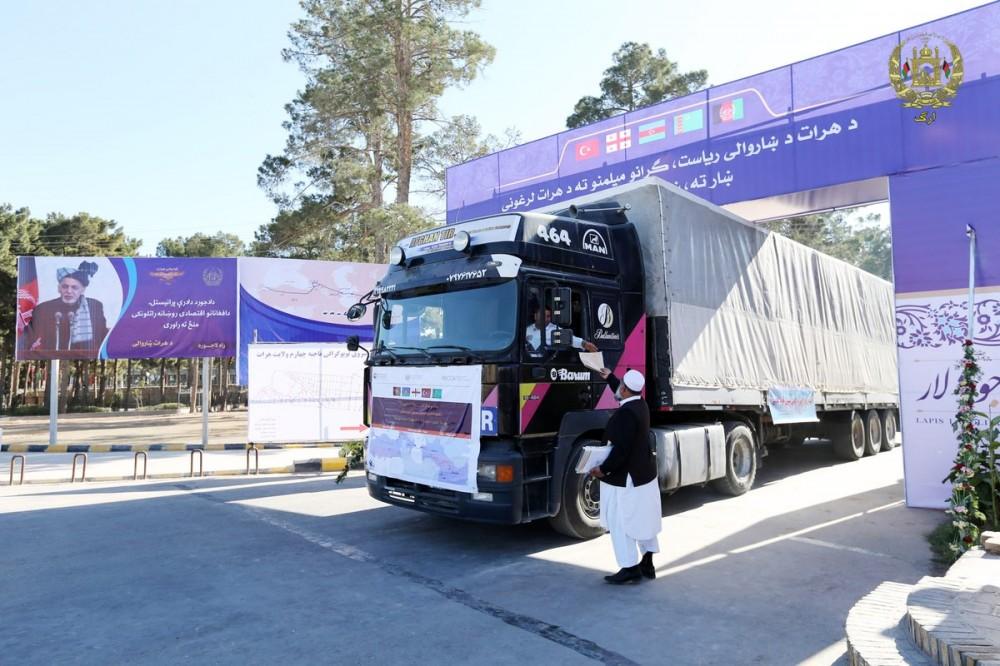Afghanistan sends its cargo to Azerbaijan via Turkmenistan

By Leman Mammadova
On 13 December, a test motorcade carrying cargo has been sent from Afghanistan’s western province of Herat, to be delivered through Turkmenistan and the Caspian Sea to Azerbaijan, Trend reports citing a source close to the transport industry of Turkmenistan.
The event was attended by representatives of Afghanistan, Azerbaijan, Georgia, Turkmenistan and Turkey - the participating countries that signed the "Lapis Lazuli" agreement during the seventh conference of regional economic cooperation on Afghanistan (RECCA VII) on November 15, 2017 in the Turkmen capital.
The Turkmen delegation was headed by Minister of Automobile Transport Orazdurdy Sukhanov.
President of Afghanistan Mohammad Ashraf Ghani took part in the launching ceremony of a transport corridor allowing Afghanistan to enter global markets bypassing the traditional Pakistani direction. Afghan president noted that although his country has been isolated from the world over the past 17 years, it will have trouble-free connection with its neighbors via this corridor.
He praised the efforts of the Presidents of Turkmenistan, Azerbaijan, Georgia and Turkey to strengthen regional cooperation, especially the Lapis-Lazuli project.
The cargo will pass from Turan to Turkganbashi International Terminal, from there to the border town of Turkmenistan, then to the Turkmenbashi International Sea Port. The caravan will then be sent across the Caspian Sea to Azerbaijan - the Baku International Sea Port.
Thanks to the modernization of the highway, the capacity of the Torghundi station has increased, its importance in Afghanistan’s trade has grown, the possibilities for bringing Afghan products to international markets have increased, as well as deliveries of imported goods to the country in a short and optimal way, the Turkmenistan State News Agency reported.
This railway, built entirely by the Turkmen side, has become part of the new transport and transit corridor Lapis Lazuli, the first expert meeting of which was held in April in Ashgabat.
It is assumed that the railway lines and motorways will connect the city of Tourghundi in the Afghan province of Herat with Ashgabat, then with the port of Turkmenbashi on the shore of the Caspian Sea. Further, the corridor will continue through the Caspian Sea to Baku, and then through Tbilisi to Ankara and Istanbul.
The project budget, which aims to facilitate transit logistics and simplify customs procedures, is estimated at $ 2 billion.
The Lapis-Lazuli route will allow the participating countries to diversify their access to regional and continental markets. This, in turn, will lead to the economic development of the countries lying along this corridor. Azerbaijan, for instance, will get huge benefits being a transit country.
The trans-regional corridor will encompass mainly railways and highways, which will connect the city of Torghundi in the Afghan province of Herat with the port of Turkmenbashi on the shore of the Caspian Sea via Ashgabat.
From Turkmenbashi, goods will be able to travel further by ferry to Baku, where they would be placed on train cars and continue westward to Europe across the South Caucasus via the newly launched Baku-Tbilisi-Kars railway. Further, the corridor will pass through Tbilisi to Ankara with branches to Poti and Batumi, and, then, from Ankara to Istanbul.
Barriers to regional trade and transit and transaction costs will be reduced, in part, through a new Custom Integration Procedure and, between Afghanistan and Turkmenistan, a new Cross-Border Transport Agreement. Its projected impact is considerable not only because most of the needed infrastructure is already in place, but also because most of the investment required will focus on improving policy and governance.
The name ‘Lapis Lazuli’ is derived from the historic route that Afghanistan’s lapis lazuli and other semiprecious stones were exported along, over 2,000 years ago, to the Caucasus, Russia, the Balkans, Europe, and North Africa.
---
Follow us on Twitter @AzerNewsAz
Here we are to serve you with news right now. It does not cost much, but worth your attention.
Choose to support open, independent, quality journalism and subscribe on a monthly basis.
By subscribing to our online newspaper, you can have full digital access to all news, analysis, and much more.
You can also follow AzerNEWS on Twitter @AzerNewsAz or Facebook @AzerNewsNewspaper
Thank you!
